| dc.contributor.author | Kao, Dominic | |
| dc.contributor.author | Harrell Jr, Douglas Alan | |
| dc.date.accessioned | 2017-12-21T14:52:04Z | |
| dc.date.available | 2017-12-21T14:52:04Z | |
| dc.date.issued | 2016-06 | |
| dc.identifier.issn | 2164-6651 | |
| dc.identifier.issn | 2164-666X | |
| dc.identifier.uri | http://hdl.handle.net/1721.1/112919 | |
| dc.description.abstract | Avatar research has almost exclusively explored avatars that remain the
same regardless of context. However, there may be advantages to avatars that change during use. A plethora of work has shown that avatars personalized in one’s likeness increases identification, while object-like avatars increase detachment. We posit that in certain situations within a game it may be more advantageous to have increased identification, while in other situations increased detachment. We present a study on dynamic avatars, or avatars that change types based on game context. In particular, we investigate what we term the successful likeness avatar. The successful likeness is an avatar that is only a likeness when the player is in a win state and at all other times an object. Our goal is to determine if this type of avatar can foster an increase in user performance and engagement. Our experiment (N=997) compares four avatars: 1) Shape, 2) Likeness, 3) Likeness to Shape, and 4) Shape to Likeness (successful likeness). We found that players using a successful likeness avatar had significantly better performance (levels completed) than all other conditions. Players using a successful likeness avatar had significantly higher play time (minutes played) than all other conditions. We propose a theoretical model in which identification facilitates vicarious outcomes and in which detachment facilitates outcome dissociation. As performance and engagement are correlated to learning (Harteveld, 2015), successful likeness avatars may be crucial in educational games. | en_US |
| dc.description.sponsorship | National Science Foundation (U.S.) (STEM+C Grant 1542970) | en_US |
| dc.description.sponsorship | Natural Sciences and Engineering Research Council of Canada (Fellowship) | en_US |
| dc.language.iso | en_US | |
| dc.publisher | ETC Press | en_US |
| dc.relation.isversionof | http://press.etc.cmu.edu/files/GLS12-Proceedings-2016-web.pdf | en_US |
| dc.rights | Creative Commons Attribution-Noncommercial-Share Alike | en_US |
| dc.rights.uri | http://creativecommons.org/licenses/by-nc-sa/4.0/ | en_US |
| dc.source | Kao | en_US |
| dc.title | Exploring the Effects of Dynamic Avatar on Performance and Engagement in Educational Games | en_US |
| dc.type | Article | en_US |
| dc.identifier.citation | Kao, Dominic and D. Fox Harrell. "Exploring the Effects of Dynamic Avatars on
Performance and Engagement in Educational Games." GLS Conference Proceedings 2017, ETC Press, 2017. | en_US |
| dc.contributor.department | Massachusetts Institute of Technology. Department of Electrical Engineering and Computer Science | en_US |
| dc.contributor.approver | Kao, Dominic | en_US |
| dc.contributor.mitauthor | Kao, Dominic | |
| dc.contributor.mitauthor | Harrell Jr, Douglas Alan | |
| dc.relation.journal | Games + Learning + Society Conference Proceedings 2017 | en_US |
| dc.eprint.version | Author's final manuscript | en_US |
| dc.type.uri | http://purl.org/eprint/type/ConferencePaper | en_US |
| eprint.status | http://purl.org/eprint/status/NonPeerReviewed | en_US |
| dspace.orderedauthors | Kao, Dominic; Harrell, D. Fox | en_US |
| dspace.embargo.terms | N | en_US |
| dc.identifier.orcid | https://orcid.org/0000-0002-7732-6258 | |
| dc.identifier.orcid | https://orcid.org/0000-0003-4992-2201 | |
| mit.license | OPEN_ACCESS_POLICY | en_US |
| mit.metadata.status | Complete | |
